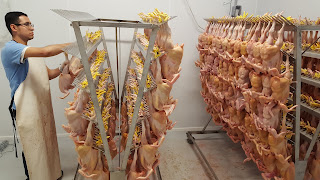"The Chicken Dance"
by: friar Rich Rome, OFM Conv.
One of
my favorite TV comedies, Arrested Development, chronicles the antics of the
hyper-affluent Bluth family who develop real estate in California. With one exception, they are all completely
(and hilariously) disconnected from the real world. And the way the show drives that point home
is that each character has a unique “chicken dance”. Whenever one character accuses another of being
a chicken, they mockingly perform their version of the dance – none of these
versions bear any resemblance to a real chicken (see gif below).
While
some societies for religious or cultural reasons do not eat pork or beef,
almost every society eats chicken. Just
about everyone on earth understands what a chicken is like (hence, the comedy
of the show). But how connected are we
on where our chicken comes from? Our
time in Ellicott City, MD and Siler City, NC revolved a
lot around chickens.
In
Maryland, we spent a morning at Mary’s Land Farm, which partners with the
friars’ own Little Portion Farm. Mary’s
Land Farm, like many of the others in the area, are trying to reconnect
people to a reality that often gets overlooked in America: where their food comes from. On this morning, we were going to help
slaughter chickens. Prior to this, my
experience with chickens was either with them alive (my 2nd grade
class raised some chicks in an incubator in the back of our room), or with them
already packaged in plastic at the grocery store.
Slaughter
was a more complicated process than I thought it would be. I was an eviscerator and I had to be very
careful where I inserted the knife to start the process. Knick this organ, and a green fluid would
spill out and contaminate the meat.
Knick another organ, and partially digested food would spill out. Most of the organs were connected and could
be removed somewhat easily with practice, except for the lungs, which were
almost impossible to get out regardless of practice. A lot of water goes into the slaughter
process to keep everything clean, but that makes holding the chicken
difficult. But the hardest part was the tedium
that started to set in: I found myself focusing so much on repeating the task,
because focusing on anything else would have made it too difficult or too
slow. After standing for 6 hours trying
to cut apart slippery chickens, I was stiff from neck to toe. As challenging as the experience was, it provided
that missing link in the chain.
The
economy of Siler City is primarily driven by chicken processing plants (a new one opened shortly before we arrived). And the plants are primarily staffed by
immigrants. Some of them have gone
through hell to come to this country, and now live in a sort of purgatory with
their immigration status. This is the
work that many of them are hired to do.
Both of
these experiences connected a human dimension to this elaborate “chicken
dance”. The farmers had spent weeks
raising the chickens, moving them from pasture to pasture early each morning,
so the chickens could eat fresh greens.
My brothers had worked with me in slaughtering them, so seeing all the
work that both they and the farmers had put into this made the
thought of wasting a chicken seem a graver act. Then meeting the amazing immigrant community
in Siler City, who do this work every day, imbued an even deeper gravity to this
“chicken dance”: people who have risked their lives, so that their children
might have a better life. While I don’t
think I was as clueless as the Bluths, I didn't understand how complex the “chicken dance” was that provides the staple protein most of us probably eat everyday.





very interesting insights, Rich!
ReplyDeleteYour story touches on so many interesting facets of justice -- and you masterfully weave them all together. Thanks for sharing. Was it hard to kill chickens? Did it change the way you think about buying or consuming them? Do you think you can look at packaged chicken the same way? Did you get to hear any stories from the factory workers? I'd love to hear more!
ReplyDelete